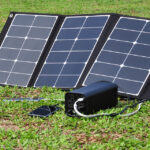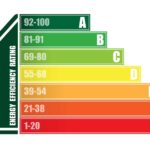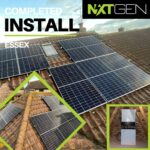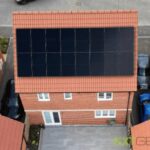In recent years, solar energy has emerged as a game-changer in the world of residential power generation. As concerns about the environment and rising utility costs continue to grow, homeowners are increasingly turning to solar energy as a sustainable and financially savvy solution. This article aims to explore the reasons why solar energy is the ultimate homeowner’s investment. We will delve into the financial benefits, environmental advantages, energy independence, property value appreciation, government incentives, and tax benefits associated with solar energy. Additionally, I’ll debunk common misconceptions surrounding solar power, ultimately encouraging readers to embrace this renewable energy source as a wise investment for their homes.
1. Understanding the Importance of Solar Energy
1.1 What is Solar Energy?
Solar energy is the radiant light and heat from the sun that can be harnessed and converted into electricity or thermal energy. It’s like having your own personal power source beaming straight from the heavens.
1.2 The Growing Significance of Solar Energy
Solar energy is no longer just a futuristic concept; it’s a booming industry. With the increasing concerns about climate change and the need for sustainable and cleaner energy sources, solar energy has become a vital player in the quest for a greener future.
2. Financial Benefits of Solar Energy for Homeowners
2.1 Reduced Monthly Energy Bills
Imagine receiving a smaller energy bill each month. With solar panels on your rooftop, you can harness the power of the sun and significantly reduce your reliance on traditional electricity. Say goodbye to those heart-stopping moments when you open your bill and see double digits—we’re talking about savings, baby!
2.2 Return on Investment (ROI) of Solar Panels
Investing in solar panels is not only about saving money on your monthly bills, but it’s also about the long-term financial benefits. A solar panel system can pay for itself over time, and depending on where you live, you may even be able to sell excess energy back to the grid. It’s like having a money-making machine on your roof, without any complicated casino rules.
3. Environmental Advantages of Solar Energy
3.1 Decreased Carbon Footprint
Using solar energy is like giving Mother Earth a great big hug. By switching to solar power, you reduce your carbon emissions and help combat climate change. It’s a win-win situation—you save money and the planet at the same time. Talk about multitasking!
3.2 Contribution to Sustainable Development
When you invest in solar energy, you become a champion of sustainable development. By supporting renewable energy sources, you’re helping to create a greener and more sustainable future for generations to come. You’ll be the cool neighbor with a green thumb, except instead of plants, you’ll have solar panels.
4. Energy Independence: Breaking Free from Energy Companies
4.1 Generating Own Power with Solar Energy
Who needs an energy company when you have the sun in your backyard? With solar panels, you can generate your own power and become less dependent on external sources. It’s like saying goodbye to unreliable cable companies and embracing the freedom of streaming. Hello, energy independence!
4.2 Reliability and Security of Solar Energy
Solar energy is the superhero of energy sources—it’s reliable and secure. You don’t have to worry about power outages or rolling blackouts because the sun always comes to the rescue. Plus, with battery storage systems, you can store excess energy for those cloudy days. It’s like having a backup generator without the noise and fumes.
So, there you have it—solar energy is the ultimate homeowner’s investment. It brings financial savings, environmental benefits, and energy independence. With solar energy, you can shine bright like the sun and enjoy a brighter and more sustainable future.
5. Increasing Property Value with Solar Energy
5.1 The Impact of Solar Panels on Home Value
When it comes to increasing the value of your home, solar panels are like the superhero of investments. Installing solar panels can have a significant positive impact on your property value, making it a smart move for homeowners looking to boost their equity. Studies have shown that homes equipped with solar panels can sell for more compared to similar homes without solar installations. So not only are you saving on energy bills, but you’re also making your home more attractive to potential buyers.
5.2 Attracting Eco-Conscious Buyers
In today’s world, there’s a growing population of eco-conscious individuals who prioritize sustainable living. By having solar panels on your roof, you’re not only reducing your carbon footprint but also attracting a specific group of buyers who are willing to pay a premium for environmentally friendly homes. These buyers are looking for properties that align with their values, and having solar energy can be a major selling point.
6. Overcoming Common Misconceptions about Solar Energy
6.1 Addressing Concerns about Initial Costs
One common misconception about solar energy is that it’s a costly investment that only the wealthy can afford. While it’s true that installing solar panels does require an upfront investment, the long-term savings and benefits far outweigh the initial costs. With government incentives, falling panel prices, and the ability to sell excess energy back to the grid, homeowners can recoup their investment relatively quickly and start enjoying the financial advantages of solar energy.
6.2 Dispelling Myths about Solar Energy Efficiency
Another misconception surrounding solar energy is that it’s not efficient enough to power an entire home. However, advancements in technology have significantly improved the efficiency of solar panels. With proper positioning and high-quality panels, solar power can easily meet the energy needs of a typical home. Plus, with battery storage options becoming more accessible, homeowners can store excess energy for use during cloudy days or at night, further enhancing the reliability of solar energy systems.
7. Embracing Solar Energy as a Wise Homeowner’s Investment
Investing in solar energy is not only a smart financial decision but also a responsible choice for homeowners looking to reduce their ecological impact. With the potential to increase property value, government incentives that make it more affordable, and the ability to overcome common misconceptions, going solar is an ultimate investment for homeowners. So, embrace the power of the sun and start enjoying the benefits of solar energy while making a positive contribution to a sustainable future.
8. Conclusion
Solar energy is not only a smart investment for homeowners but also a significant step towards a sustainable future. By harnessing the power of the sun, homeowners can enjoy reduced energy bills, increased property value, and a decreased carbon footprint. Moreover, government incentives and tax benefits make transitioning to solar energy even more financially appealing. As I dispel misconceptions and embrace the numerous benefits of solar energy, it becomes clear that investing in solar panels is not only a sound financial decision but also a responsible choice for the planet. It’s time for homeowners to take advantage of this ultimate investment and pave the way towards a greener tomorrow.
Considering the various factors discussed in this article, investing in solar panels can indeed be a viable option for homeowners in the United Kingdom. While there are upfront costs involved, government incentives, long-term savings on electricity bills, and the positive impact on the environment make solar panels an attractive choice. By harnessing the power of the sun, homeowners can not only reduce their carbon footprint but also enjoy financial benefits in the long run. As renewable energy continues to play a crucial role in the UK’s energy landscape, embracing solar panels can be a sustainable and responsible decision for a brighter and greener future.
NXTGEN Energy are MCS Certified Solar PV and Battery Storage Installers
Remember not all Solar Panel Installers are MCS Certified! NXTGEN Energy Ltd. are proud to be both MCS Certified Solar PV (Panel) Installers and also MCS Certified Battery Storage Installers. We are 1 of only 10 Solar Installers in Essex who are certified on both Solar PV and Battery Storage. This means we can install your complete Solar PV System to the high quality, performance, and safety as required by MCS Certification in the UK. Have you checked your installer on mcscertified.com?
If you are thinking of installing solar panels, solar battery storage or both, contact us here at NXTGEN Energy for a free no-obligation quote and solar PV system design on 01268 928 690, email: info@nxtgen.ltd or by clicking on the ‘Enquire Now’ button below. Think Solar? Think NXTGEN Energy!
NXTGEN Energy – Your Trusted Solar Energy Solutions Partner 💚
Frequently Asked Questions about solar panels
Solar panels are designed to generate electricity from sunlight, but they can still produce energy in cloudy or less sunny regions. While the efficiency might be slightly reduced, solar panels can still be a valuable investment in areas with less sunlight. Modern solar technology has come a long way in maximizing energy production even in less sunny climates.
The payback period for solar panels can vary depending on factors such as location, energy usage, system size, and available incentives. On average, homeowners can expect to recoup their initial investment within 5 to 10 years. However, it’s important to note that solar panels have a lifespan of 25 to 30 years, allowing homeowners to enjoy free or significantly reduced electricity costs long after the payback period.
In most cases, the installation of solar panels does not require major changes to your home’s existing electrical system. Solar panels are typically connected to the electrical grid through an inverter, which converts the DC power generated by the panels into AC power used in homes. Professional solar installers ensure a seamless integration of the system into your home’s electrical setup, minimizing any disruptions or modifications.
During a power outage, traditional grid-tied solar systems automatically shut down to prevent back-feeding electricity into the grid, which could pose a danger to utility workers. However, there is an option to include batteries in your solar system, creating a backup power source for your home. With a battery storage system, you can continue to power essential appliances and maintain electricity during outages, enhancing your energy independence and resilience.
Latest Solar Panel Posts
- Guide to Solar Powered Generators☀️ Solar powered generators are generally small, quiet and ideal for camping or boating trips. ☀️ Solar powered generators are usually easier to maintain than fossil fuel-powered generators. ☀️ Solar powered generators can be expensive, and don’t always have a high power output. Solar energy is essential for a greener future. And portable solar powered… Read more: Guide to Solar Powered Generators
- Is it worth buying solar panels in Kent?Imagine this: you go to switch on the kettle and a surge of guilt hits you as you remember the ever-increasing electricity bill. Sound familiar? Well, what if there was a way to harness the power of the sun and slash your energy costs? Kent, with its decent sunshine hours, might be the perfect place… Read more: Is it worth buying solar panels in Kent?
- Solar PV Servicing, Health Check or Solar MOT – NOAttention solar owners, It is of utmost importance that you exercise caution and refrain from allowing any individuals into your home to inspect your Solar PV system. Consider this: Does a random cold caller possess accurate knowledge about your installer going bankrupt, the potential malfunctioning of your solar PV system, or the expiration of your… Read more: Solar PV Servicing, Health Check or Solar MOT – NO
- Why Leisure Centres Should Invest in Solar PanelsIn recent years, the concept of sustainability has become increasingly vital in various industries, including leisure centres. As the global focus shifts towards environmental conservation and renewable energy sources, leisure centres are recognizing the importance of investing in sustainable practices to reduce their operating costs and their carbon footprint. One such sustainable solution gaining traction… Read more: Why Leisure Centres Should Invest in Solar Panels
- School Funding – Solar for SchoolsSolar energy is revolutionizing the way educational institutions approach sustainability and energy consumption. As schools seek innovative solutions to reduce costs, educate students about renewable energy, and minimize their environmental impact, the adoption of solar power has emerged as a compelling choice. Solar For Schools, a leading initiative in the field, empowers educational institutions to… Read more: School Funding – Solar for Schools
- Homes with solar panels can sell for more than those withoutHarnessing the power of the sun to generate clean, renewable energy is not only a sustainable choice for homeowners but also a lucrative investment in the UK property market. Homes equipped with solar panels are increasingly commanding higher prices and attracting more buyers than their non-solar counterparts. In this blog post, we’ll delve into the… Read more: Homes with solar panels can sell for more than those without
- Solar Panels and EPC RatingsSolar panels have become increasingly popular as a sustainable energy solution, offering numerous benefits for both residential and commercial properties. In parallel, Energy Performance Certificate (EPC) ratings serve as indicators of a building’s energy efficiency. Understanding how solar panels can impact EPC ratings is crucial for maximizing energy savings and environmental benefits. This blog post… Read more: Solar Panels and EPC Ratings
- Is it worth buying solar panels in Basildon, Essex?☀️ Over 10,000 homes in Basildon have a solar panel system installed. ☀️ You’ll normally break even on solar panels in less than 10 years. ☀️ A 3.5kW solar panel system will cost about £7,000 on average. Solar panels are becoming more affordable and more common in the UK, with over 1.3 million households already… Read more: Is it worth buying solar panels in Basildon, Essex?
- Wiltshire’s Good Energy Partners with bigHead to Achieve 50% Solar Energy GoalWiltshire-based Good Energy has played a crucial role in helping Dorset manufacturing firm bigHead transition to utilizing solar power for 50% of its energy needs. Thanks to the collaboration between the two companies, bigHead has successfully installed 130 solar panels on the roof of its Verwood factory, resulting in significant cost savings of over £4,000… Read more: Wiltshire’s Good Energy Partners with bigHead to Achieve 50% Solar Energy Goal
- Unveiling the Perfect Fit: How Many Solar Panels Can Your Roof Handle?Harnessing the power of the sun is an attractive proposition for many UK homeowners. But before diving headfirst into solar energy, a crucial question arises: how many solar panels can fit on your roof? The answer, unfortunately, isn’t a simple one. It’s a captivating interplay between several factors, each one requiring careful consideration. Understanding Your… Read more: Unveiling the Perfect Fit: How Many Solar Panels Can Your Roof Handle?
- Powering Care with Sunshine: How Solar Panels Benefit Nursing HomesNursing homes are the backbone of our communities, providing essential care for our elderly population. But keeping these facilities running smoothly requires a significant amount of energy – lighting, heating, cooling and medical equipment all contribute to a hefty energy bill. This is where commercial solar panels come in, offering a win-win solution for both… Read more: Powering Care with Sunshine: How Solar Panels Benefit Nursing Homes
- Who are NXTGEN Energy Ltd?NXTGEN Energy Ltd are a solar energy company based in Rayleigh, Essex, UK. They specialize in the installation of solar panels, battery storage systems, and electric vehicle chargers for homes and businesses across the UK. They are MCS certified, which means they meet the Microgeneration Certification Scheme’s standards for quality and safety. This makes them… Read more: Who are NXTGEN Energy Ltd?













